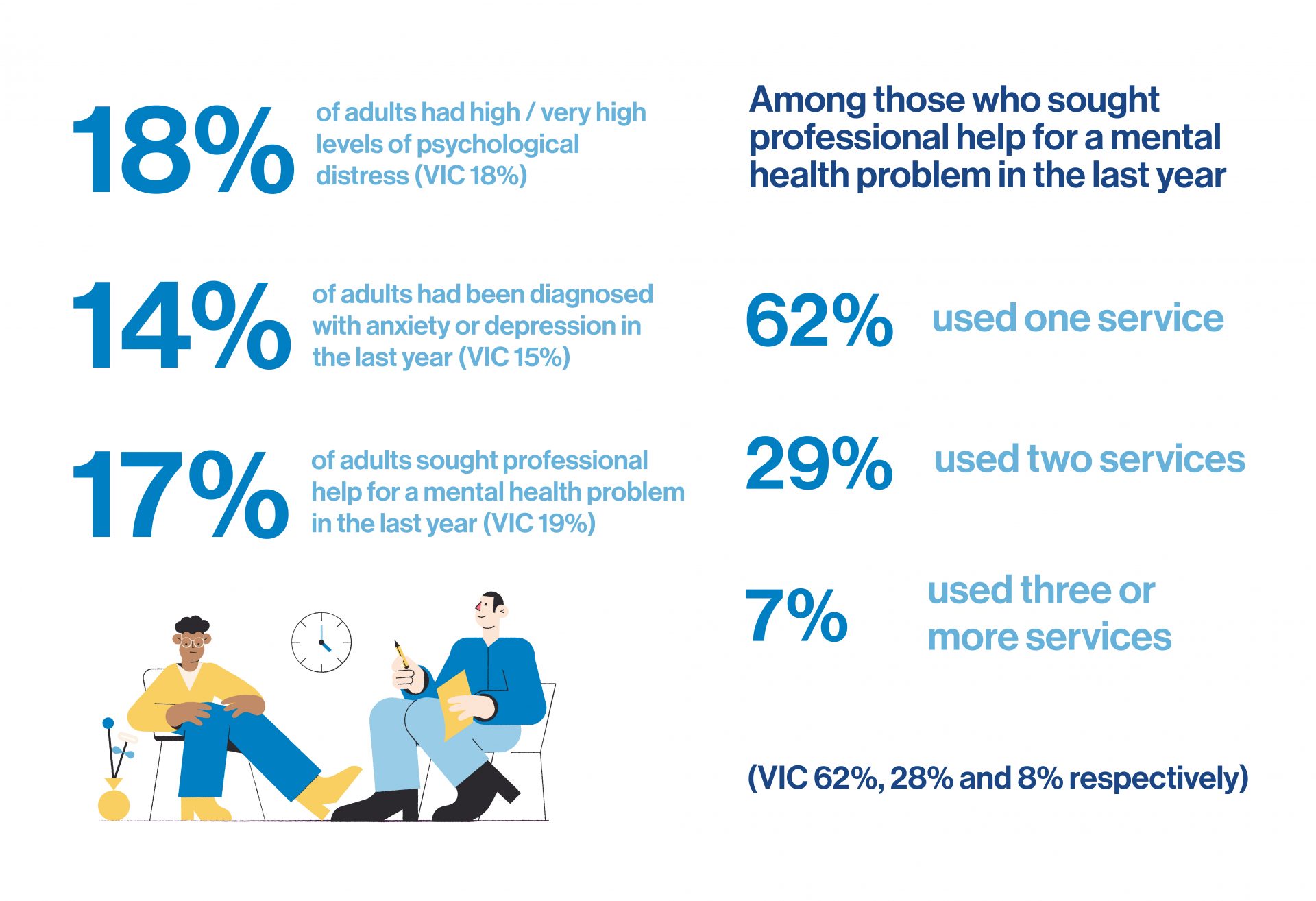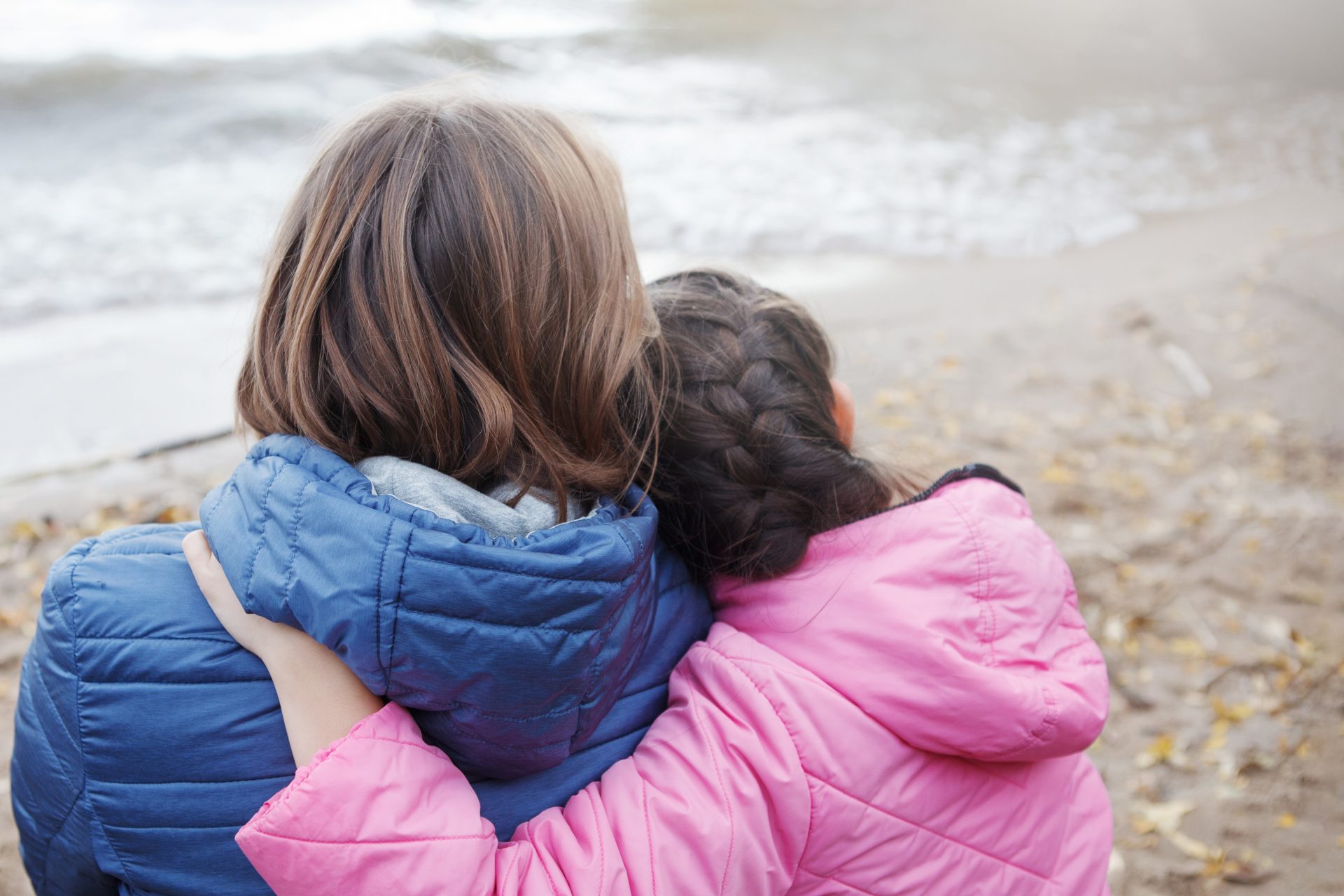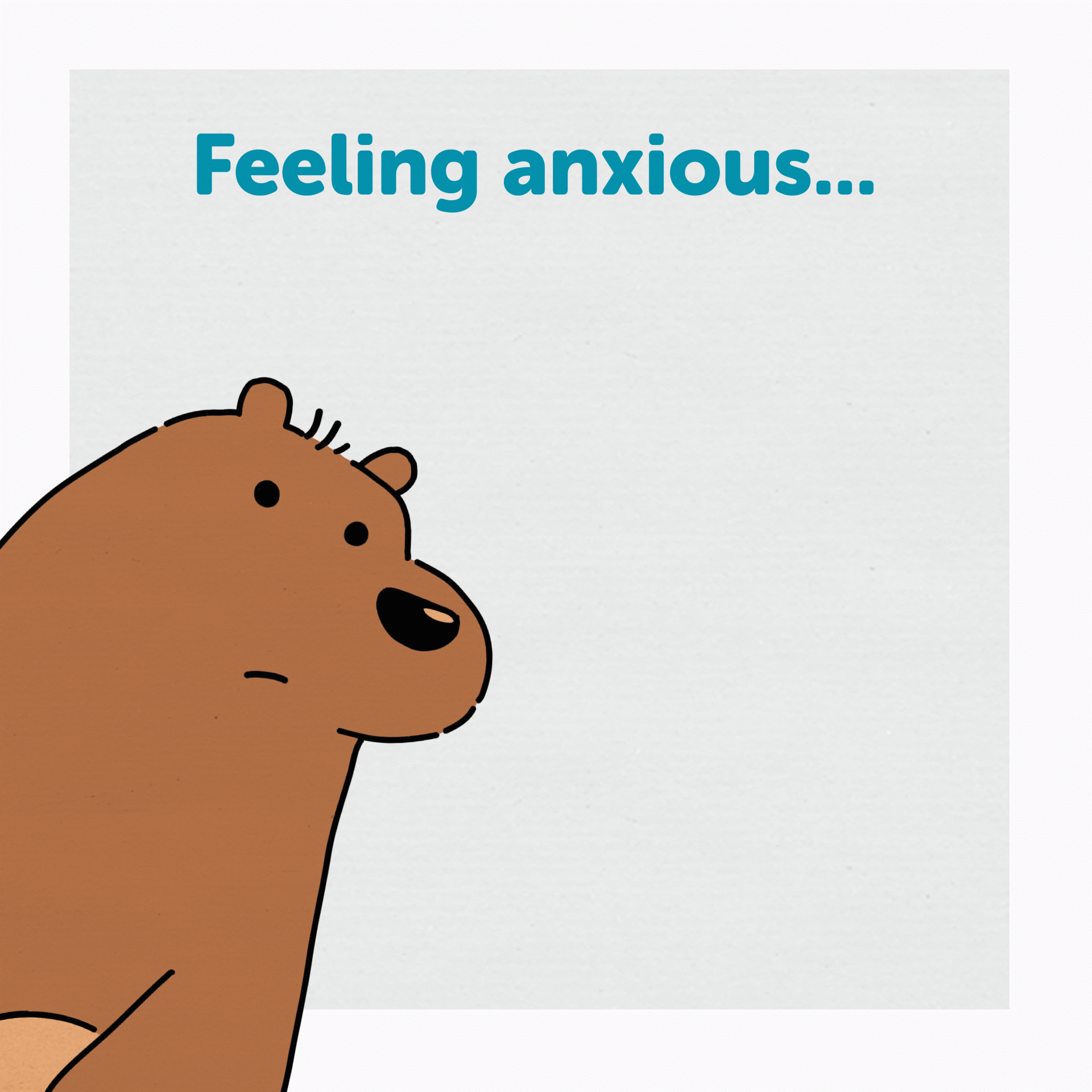Managing the increased need for mental health support
SEMPHN continues to assess the mental health needs of our community, including the impact from COVID, and service accessibility across the catchment to help provide appropriate care to support our most vulnerable community members.
Understanding who needs services
It is estimated that across the catchment, there are over 300,000 people impacted by poor mental health with the highest rate estimated to be living in Frankston.
Adding to the complexities of COVID-19 infections are of the socio-economic determinants that placed additional burdens on mental and emotional wellbeing of our community during 2020-21.

Key Highlights
- For the month of April 2021, people in Victoria accessed over 300,000 mental health-related Medicare Benefits Schedule (MBS) services over a four-week period.
- Within these four weeks, mental health services in Victoria increased by 20 per cent compared to the month of April 2020.
- During that time, 31 per cent of these services were delivered via telehealth, compared to 14 per cent nationally.
Since 2020, SEMPHN has invested an additional $5.1M into new and existing adult mental health services to support the impacts of the pandemic.


The additional 5.1M in funding was used to establish:
-
Establish HeadtoHelp Hubs
-
Provide psychological Interventions for people over 65
-
Increase capacity for existing SEMPHN programs including Accessible Psychological Interventions (API), Family Connect, First Peoples, Integrated Team Care (ITC)
Accessible Psychological Interventions
API offers accessible ways for people with mild depression or anxiety to access the mental health services they need
Accessible Psychological Interventions (API) has continued to deliver high quality, goal directed psychological interventions for hard to reach populations within the community.
In 2020-21, SEMPHN invested an additional $924,000 to the API program to help increase service capacity and greater flexibility during COVID.
Key Highlights
In 2020-21:
- Almost 2,450 clients were referred to the API program
- 74% of clients these clients had structured psychological intervention
- Approximately 80% of clients had 45 minutes or more clinical consultations
From July 2020 to December 2020:
- 35% of consultations took place via telephone
- 12% of consultations occurred via video consultations
Kylie’s Story
Since accessing API, Kylie has improved her way of thinking about her core values through therapeutic treatment and has used her strengths to help her regain trust and appreciation of others in her recovery journey.

Kylie first connected with the API program after experiencing family violence with her now ex-husband. When Kylie first entered the API program she was working through personal challenges of guilt (through a ‘failed’ marriage) and lack of self-confidence.
The API program helped Kylie to focus on her behaviours and to develop unconditional positive feelings towards herself. She was able to reflect on her past experiences with acceptance and was able to understand that her emotional pain was also her strength, as a kind and empathetic person to others.
Since commencing her treatment through API, Kylie has started part-time work and has ambitions to enrol in a university course to increase her self-confidence and achieve even more through an academic path.
API will continue to provide eligible south east residents with a range of short-term psychological interventions into 2022.
To find out more about API and how to refer visit: https://www.semphn.org.au/resources/mental-health/accessible-psychological-interventions.html
Psychological support for people living in aged care facilities
In 2020-21, SEMPHN invested an additional $725,000 to deliver psychological interventions for older people in south east Melbourne
Mental health services are not routinely available to older people in Residential Aged Care Facilities (RACF) despite the evidence that residents have very high rates of mental ill-health.
Approximately 39 per cent of all permanent aged care residents live with mild to moderate depression and 40 per cent of residents with dementia are likely to experience a co-morbid mental health or behavioural problem.
SEMPHN’s role and commitment to address gaps in health services across the catchment led to the commissioning of Accessible Psychological Interventions (API) in RACFs to provide mental health services to this underserviced group.

The RACF Psychological Services program first launched in 2019 as a pilot program in the Mornington region for six months. Following its success, the program expanded in 2020-21 to include 63 RACF’s across the SEMPHN catchment.
The program offers flexible, brief and goal-directed psychological interventions on-site at RACFs to support residents with mental ill-health. Having interventions on-site removed any travel or accessibility barriers that had previously occurred.
In 2020-21, SEMPHN partnered with Better Place Australia and Star Health, to deliver a range of individual and group psychological interventions in Residential Aged Care Facilities (RACF) that are consistent with those available under the Commonwealth Better Access to Mental Health Care program.
During COVID, RACFs became the centre of many COVID outbreaks, resulting in restricted access to facilities and leaving residents vulnerable to even greater risks of mental ill-health. Better Place Australia and Star Health rapidly implemented remote consultations for residents using telehealth, so that care could continue during lockdowns.
Mental health support during challenging times
During lockdowns, wi-fi services were installed in some facilities and, with support from SEMPHN, mobile phones were purchased on short term contracts for facilities where no phone lines were available to support online telehealth.
“Working with SEMPHN has been amazing! Knowing that they would support us was a lifeline, not only for the program but also for the residents. It meant we could continue to be agile and respond to whatever was coming next,” said Michelle.
Manager for Wellbeing Support Services for Older Adults, Michelle Arnel, and her team at Star Health have been providing psychological support to 53 RACFs in south east Melbourne. They understand the need and the complexities that residents face when accessing mental health support.
“We found residents are accessing this service for many reasons like depression, anxiety – even family issues”, said Michelle.
“Others are experiencing grief or loss of an ability, their independence, a relationship or physical decline. Some have experienced a recent trauma or have had difficulty adjusting to life in their new home.”
The service also continued the care of residents who received mental health services before they came to the facility. Michelle said without this program, their care would have stopped or been compromised.

Star Health had been offering face-to-face support for only a few months before the first COVID-19 lockdown began in March 2020.
“My team were resilient, agile and innovative, even as COVID was unfolding, to assess and deliver what residents needed most,” Michelle said.
An information network between other RACFs delivering the same program was established and became a popular way to share collective knowledge and experiences.
“We would share what we were doing. We thought it might help other teams in the same situation and it was a great help. We worked with everybody, across Australia to make sure we got the best outcome for everyone.”
During Victoria’s lockdown, telehealth, phone and online options were used to help residents both in their rooms and in hospital, to manage feelings of fear and isolation.
Michelle explained, “In many cases, a wi-fi service wasn’t even connected, and we couldn’t use the phone lines in the facilities. Even when we could get a connection, most residents did not know how to use an iPhone or an iPad.”
In some cases, Michelle and her team used her own devices (and wi-fi) to connect residents with loved ones and mental health professionals, creating a safe space to discuss their concerns, give reassurance and peace of mind.
Star Health commenced this program with six full time staff and now employs nine full time and two part time staff across 53 of their contracted facilities. In addition, Star Health established relationships with Swinburne University, RMIT and the University of Melbourne to train and support Master of Social Work Students and fourth year psychology students as part of a student placement program.
In 2020-21, 12 students completed their placements resulting in approximately 500 hours for social workers and 70 working days for psychology students.
“I really enjoyed working with an older cohort and having my assumptions about older people challenged and confronted and ultimately changed. I know I have a much deeper understanding about this cohort and the problems they are facing” – placement student
To find out more about this program visit: https://www.semphn.org.au/commissioning/mental-health.html.
HeadtoHelp supports Victorians during the pandemic
HeadtoHelp is a unique service, and the first state-wide step towards integrating the mental health system and coordinating care for people, when and where they need it most
As 2020 progressed, the Commonwealth and Victorian Governments recognised that the ongoing restrictions in Victoria in place to stop the spread of COVID-19 were significantly affecting people’s mental health.
More Victorians were seeking mental health support, and services couldn’t keep up with the demand. HeadtoHelp, a $26.9 million initiative and part of the $31.9 million federal government mental health package to support Victorians during the COVID-19 pandemic, was born.
Overseen by a joint federal and state Mental Health Pandemic Response Taskforce, the six Victorian Primary Health Networks mobilised rapidly to establish the HeadtoHelp service: a place within Victorian communities for people to access mental health care as early and as conveniently as possible.
PHNs worked together so quickly, that only one month after announcing the initiative, a state-wide intake service 1800 595 212 and fifteen new dedicated mental health hubs opened to the public on 14 September 2020 – nine in Greater Melbourne and six in regional Victoria.

HeadtoHelp state-wide campaign
The campaign delivered a multi-channel, state-wide campaign which positioned HeadtoHelp as a ‘circuit breaker’, giving people a way to take action and take back a bit of control, and feel a sense of relief that they were doing so.
Building awareness and trust in the new HeadtoHelp brand and service was key to ensuring that people used the service. The focus was to talk to people who were already considering getting help and/or actively searching for it.
The campaign aimed to speed up decision-making, so it had two simple key messages:
- Call 1800 595 212 to find the best mental health support for you
- The sooner you HeadtoHelp the better you’ll feel.
HeadtoHelp’s campaign character was a bear, chosen as a universal symbol of comfort that would work across Culturally and Linguistically Diverse (CALD) communities and all age groups.
The campaign comprised two periods:
- A six-week campaign in November 2020, comprising social media, google search, Spotify and radio including CALD community radio stations and programs and displayed on 15 outdoor billboards in high visibility locations across the state.
- A four-week campaign in April 2021 was timed for the end of Job keeper and to build on the momentum generated by the original campaign.
Measuring campaign success
“The HeadtoHelp service has kept me alive, off drugs and continued working. After a long history of problems, I was at the point of ending my life. In a last-ditch attempt to get help I reached out to HeadtoHelp and found the help I needed from a team who were understanding and not scared to look at things from my perspective or tell me what I needed to hear. They literally saved my life!” – HeadtoHelp client
SEMPHN supported the establishment of 3 local HeadtoHelp hubs in Frankston, Berwick and Officer
Across Victoria, from 14 September 2020 to 30 June 2021:
- 10,698 people called or made an enquiry to HeadToHelp
- 5750 people were referred to an appropriate service: 88% to HeadToHelp hubs, 12% to other services
- 5074 people received services like counselling or psychology from HeadtoHelp hubs
- Around 80% of consumers who have completed their care with a HeadtoHelp hub have shown a significant improvement in their mental health.
Highlights from South East Melbourne from 14 September 2020 to 30 June 2021:
- Over 2,400 calls were received for HeadtoHelp information or support
- Over 800 people in south east Melbourne were referred to HeadtoHelp with 2,639 sessions accessed in person and 4,227 sessions delivered via telehealth or telephone.
After an assessment, 92% of people who accessed HeadtoHelp showed an improvement in their mental health.
Federal Minister for Health and Aged Care Greg Hunt announced an extension to the funding on 8 August 2021 for twelve of the Victorian HeadtoHelp hubs until 30 June 2022. The HeadtoHelp model of care and 1800 595 212 intake number are now also being used for the 10 Head to Health hubs in NSW.







 More services to meet mental health needs
More services to meet mental health needs